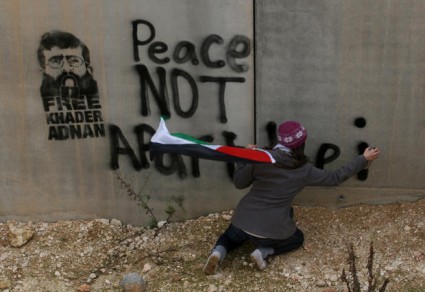What Palestinian political prisoners are fighting for
What Palestinian political prisoners are fighting for
Ameer Makhoul – The Electronic Intifada – 20 March 2012
Khader Adnan’s hunger strike was in protest of Israel’s entire system of repression.

Someone with back turned to camera spray paints “Peace not apartheid” and Khader Adnan stencil on West Bank wall
(Issam Rimawi / APA images)
The case of the freedom fighter Khader Adnan reminds us of where the strength of the Palestinian people lies. This is the strength that was squandered and dissipated in the Oslo process and the pursuit of a state at the expense of national liberation.
With his historic hunger strike and his heroic resolve in his fight against the occupying state, Adnan has reaffirmed an important principle of resistance to colonialist regimes: when the people, or individuals, who are their victims remain resolute, the world will react. Sympathy turns into solidarity, and that in turn can nurture a growing movement of support for the struggle which is capable of shaking the foundations of the colonialist system.
His case has also confirmed the fact that the colonizer’s agencies can never protect its victim. Its project can only be defeated by breaking the dominance of those agencies and the rules they enforce.
Adnan’s battle for life and dignity is a model to be emulated in the Palestinian liberation struggle. It has lessons to offer the participants in that struggle, including prisoners and international solidarity activists, on how their work can be integrated.
Campaign of defiance
Adnan seized the initiative and declared an open-ended hunger strike to protest against his imprisonment under an administrative detention order. His aim was clear: to defy both the order and the Israeli system of oppression. He also was seeking to serve notice that Palestinians refuse to accept the treatment meted out to them by the occupation authorities.
The campaign he triggered illustrated how the components of popular struggle can be brought together. Inspired by the prisoner’s determination, Palestinians in the 1948 territories responded quickly. A popular media and mobilization campaign was rapidly launched, both locally and internationally. A variety of youth and other grassroots organizations became immediately involved, as did prisoners’ families and political groups. …more






























Add facebook comments
Kick things off by filling out the form below.
Leave a Comment